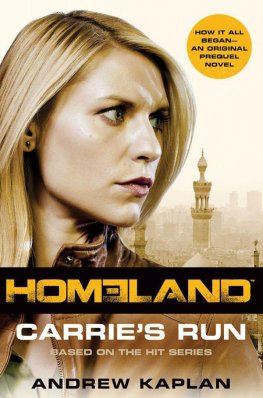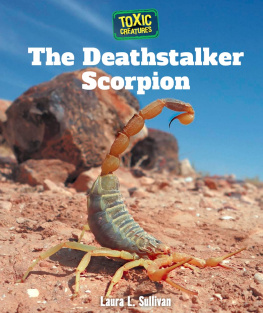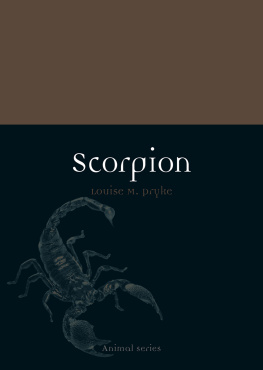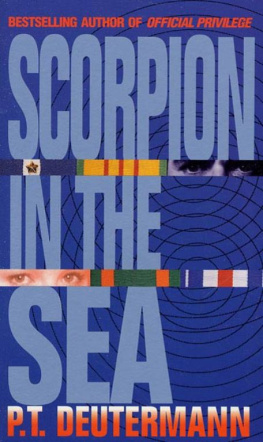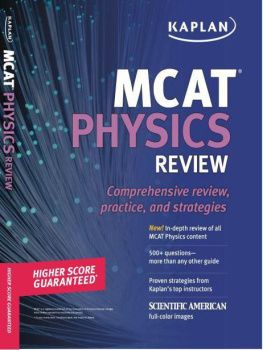Andrew Kaplan - Scorpion Deception
Here you can read online Andrew Kaplan - Scorpion Deception full text of the book (entire story) in english for free. Download pdf and epub, get meaning, cover and reviews about this ebook. year: 2013, publisher: HarperCollins, genre: Detective and thriller. Description of the work, (preface) as well as reviews are available. Best literature library LitArk.com created for fans of good reading and offers a wide selection of genres:
Romance novel
Science fiction
Adventure
Detective
Science
History
Home and family
Prose
Art
Politics
Computer
Non-fiction
Religion
Business
Children
Humor
Choose a favorite category and find really read worthwhile books. Enjoy immersion in the world of imagination, feel the emotions of the characters or learn something new for yourself, make an fascinating discovery.

- Book:Scorpion Deception
- Author:
- Publisher:HarperCollins
- Genre:
- Year:2013
- Rating:5 / 5
- Favourites:Add to favourites
- Your mark:
- 100
- 1
- 2
- 3
- 4
- 5
Scorpion Deception: summary, description and annotation
We offer to read an annotation, description, summary or preface (depends on what the author of the book "Scorpion Deception" wrote himself). If you haven't found the necessary information about the book — write in the comments, we will try to find it.
Scorpion Deception — read online for free the complete book (whole text) full work
Below is the text of the book, divided by pages. System saving the place of the last page read, allows you to conveniently read the book "Scorpion Deception" online for free, without having to search again every time where you left off. Put a bookmark, and you can go to the page where you finished reading at any time.
Font size:
Interval:
Bookmark:
Andrew Kaplan
Scorpion Deception
All war is deception.
Sun TzuPROLOGUE
Khorramshahr, Iran
1986
The boy was next in line to be shot. He was thin, dark-haired, about seven, small for his age. He was younger than the other boys, most of them teenage Basiji, volunteers for the front. They had been rounded up from schools and playgrounds across Iran to be shahidan. Martyrs. There werent enough guns or ammunition for the Iranian forces fighting the Iraqis. The Basiji boys were sent unarmed to clear the minefields with their bodies ahead of the human wave attacks of Iranian Army and Pasdaran Revolutionary Guard soldiers. Saddam Hussein has artillery; Iran has men, the ayatollahs said.
But the boys lined up were those who had panicked under enemy fire or ran when the first mine exploded. They had been brought to a warehouse parking lot near the port to be executed for cowardice. The warehouses brick wall and the concrete pavement in front of it were stained red and pockmarked by bullets.
The executions had gone on for almost an hour when it became the boys turn. His small size caught the eye of the Pasdaran commanders wife, Zeeba. In her black chador she was a common figure at these executions. Among the Baradaran of the Revolutionary Guard in Khorramshahr, the woman Zeeba was called Mother Death. It was said she had more steel for the Revolution in her than any man.
Whats that one doing there? Hes too little for a shahid, she said.
Her husband checked his clipboard.
Hes a Yahud. A Jew. From Isfahan.
There had been a recent execution of Jews, Zionist spies for Israel, in Isfahan. No doubt the boys family had been caught up in it, she thought. What a pity. Such a good-looking little boy with beautiful brown eyes. Something in his eyes made her uncomfortable. They reminded her of her own son, Rahim. Two Pasdaran guards grabbed the boy and marched him toward the wall. There were some forty bodies stacked like wood. They were beginning to stink in the hot sun.
Just then, the sirens sounded, followed by the high-pitched sound of an incoming Iraqi shell.
Incoming! Take cover! someone screamed, immediately followed by an explosion in the street. Everyone started running.
There was a bomb shelter in the port, but there wasnt time to reach it. As Zeeba ran for cover next to the wall, she heard the whistle of a shell sounding like it was coming right down on top of her. Allahu akhbar! God is great! It was all she had time to think or pray before it exploded in the parking area, killing two of the prisoners and scattering the rest. The force of the blast knocked her off her feet. She could smell the explosive and feel its hot wind on her skin. She got up and started toward the warehouse. As she did so, the little boy ran into her.
She held him. He didnt try to get away. Just looked up at her with those brown eyes. At that moment she did something she was never able to explain to herself. Perhaps because the shell had come so close and shed almost just died. Or because before the Revolution, her best friend in school, Fareeza, had been Jewish. She grabbed the boys arm and began running out of the parking area with him. Out of the corner of her eye she could see her husband looking strangely at her. She continued running.
In the street, people were lying on the pavement, some wounded, others with their arms over their heads. Still others ran to get inside the warehouse. A shell screamed overhead and exploded near a building on the street leading to the port. Pieces of the building rained down around them, peppering the street with shrapnel. Zeeba hit the ground, pulling the boy down with her. She could feel him trembling against her as fragments of the building splattered around them. They lay in the street waiting for the next shell to blast them into nothingness. Was what she was doing a sin? she wondered.
Another shell exploded down toward the Bulwar Road near the harbor. As a woman, she did not know the Quran as a good Muslim should, but she seemed to remember something about the Prophet of Allah, peace be upon him, saying that it was good to help orphans. She had heard about the executions in Isfahan. Two Jewish women had been raped over a hundred times before they were killed. The men, those Zionist jasoosa, had been chained between trucks and literally pulled to pieces. She looked at the boy. Was it possible he had witnessed such things?
O Allah, you demand much, she thought, wondering if she should just walk away. If she brought the boy back to the warehouse or left him here, he would surely die. A shell exploded far up the street. A second shell exploded louder and closer, less than a hundred meters away. The next one would come down right on top of them. She buried her head in her arms, certain she was about to die, the boy next to her on the pavement. She waited, every nerve screaming, unable to breathe.
Nothing happened.
The shelling had stopped. Zeeba looked up. People were starting to get off the ground. She stood and pulled the boy up with her. What should she do? She didnt even know why she had saved him. What had possessed her? What would she tell her husband? It was just that he looked so little standing there, not much bigger than Rahim.
She knew she had to do something. People were walking, running, some looking anxiously to the west, toward the Iraqi front. The shelling might start again any minute. She took the boys hand and began walking, remembering that before the Revolution there had been a synagogue a few blocks from here. She walked quickly, pulling the boy with her.
What is your name? she asked him.
He looked at her but didnt answer. Was he dumb? she wondered. Traumatized? He wasnt retarded. His eyes were too intelligent for that. Perhaps for Allah, his name didnt matter.
She turned the corner and saw the old synagogue. It looked battered, ruined. All the buildings in the city were scarred, but this one was barely standing, more a ruin than a building. There were holes in the facade and roof, and deep scars gouged by bullets and shrapnel during the fighting. Someone had painted Marg bar Esrail, Death to Israel, on the door. She knocked and waited.
No one answered. She knocked again. And again.
A small door in the building next to the synagogue opened. It looked like a shop where they had stopped selling anything a long time ago. A gray-haired man stepped out. He wore a tattered suit jacket and a kipa on his head.
Salam. May I help you, khanoom? the man said.
Here, she said, shoving the boy at him. Hes a Yahud, from Isfahan. If you dont take him, hell be executed.
The man looked at her. The boy looked at neither of them. He said nothing. Zeeba turned and walked away. She kept waiting for the boy or the man to call after her, but there was only the scrape of her shoes on the pavement and the sun casting her shadow ahead of her as she walked. When she reached the corner, she looked back. The street was empty. The Jews, she thought. They take care of their own. Something we could learn from them.
She never saw the boy again.
It took the Jews two weeks to move the boy, whom they named Davood, from Khorramshahr to Tabriz. With the help of Kurdish smugglers, they got him over the mountains to Mosul in Kurdish Iraq and from there to Turkey. In Diyarbakir, a local Jewish businessman provided the boy with false papers that got him on a flight from Istanbul to Tel Aviv.
The boy arrived alone at two in the morning at Ben Gurion Airport in Israel. He was the last one off the plane. By the time he walked out, the other passengers had left the gate area. The only one there to meet him was a heavyset middle-aged Iranian Jew, Shlomo, from the Sochnut, the Jewish Agency.
Font size:
Interval:
Bookmark:
Similar books «Scorpion Deception»
Look at similar books to Scorpion Deception. We have selected literature similar in name and meaning in the hope of providing readers with more options to find new, interesting, not yet read works.
Discussion, reviews of the book Scorpion Deception and just readers' own opinions. Leave your comments, write what you think about the work, its meaning or the main characters. Specify what exactly you liked and what you didn't like, and why you think so.

